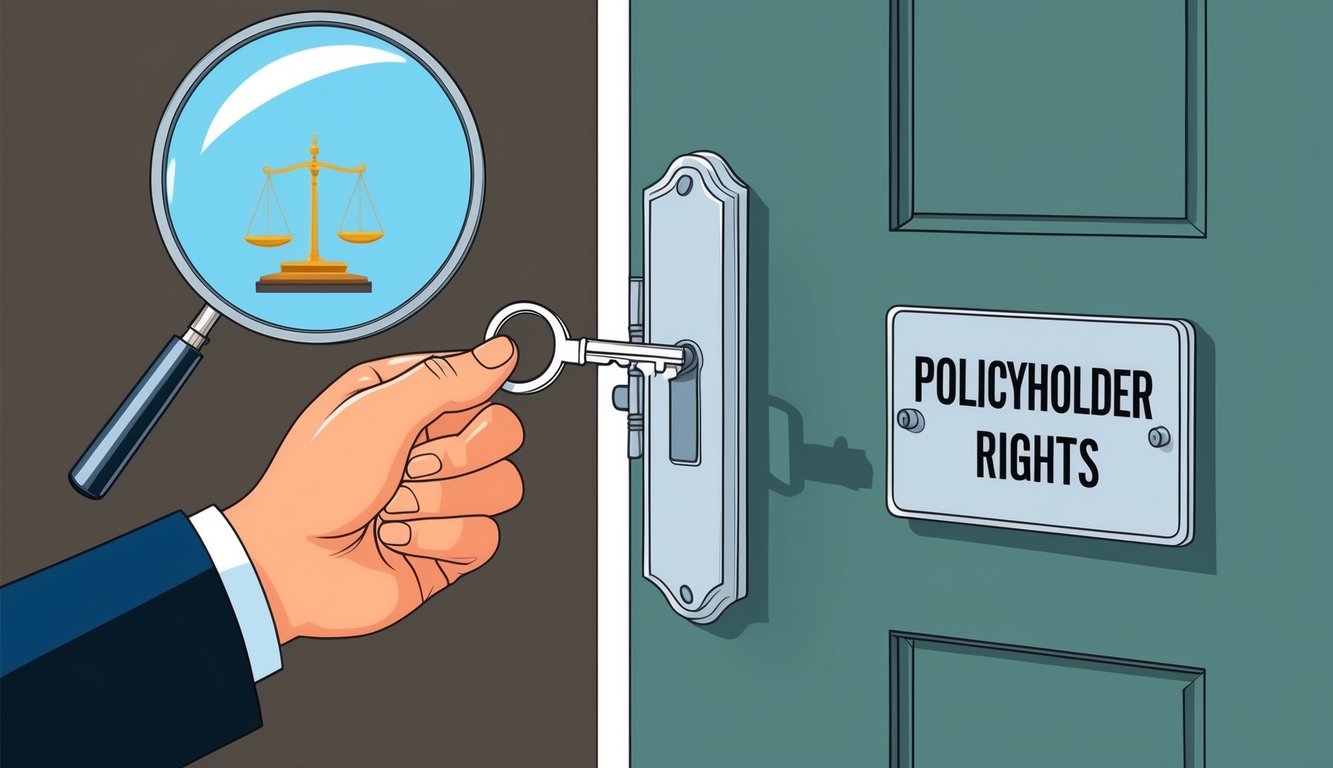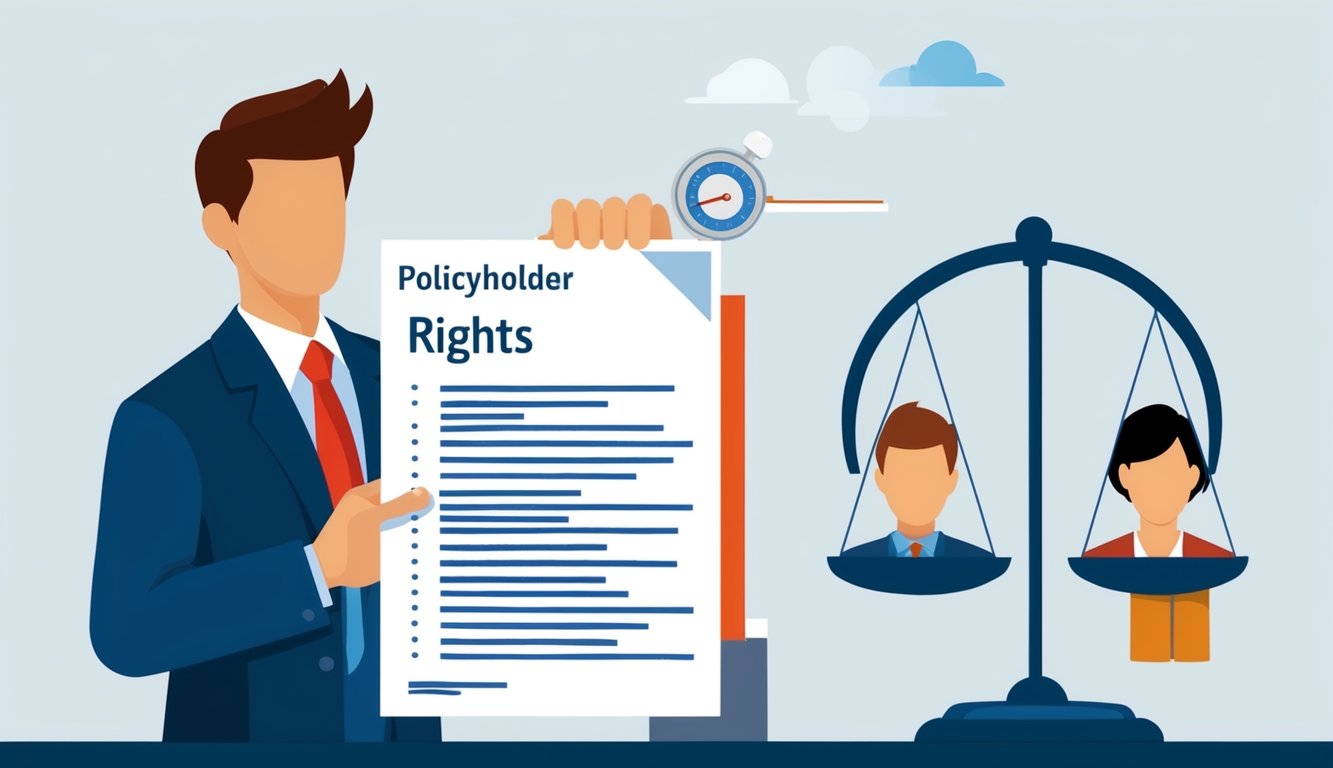Understanding Policyholder Rights
As a policyholder, you enter into a legally binding agreement with an insurance company through an insurance contract.
This contract outlines your rights and responsibilities.
Rights of a Policyholder
- Policy Management: You can update, renew, or cancel your insurance policy.
- Claim Filing: You have the right to file claims when a covered event occurs.
- Information Access: You are entitled to access all information related to your policy.
Your responsibilities include paying premiums on time and providing accurate information when applying for insurance.
Fulfilling these obligations helps maintain your coverage.
If you believe your rights as a policyholder are not being respected, you can contact your insurance company for clarification.
If issues persist, consider reaching out to regulatory bodies or consumer advocacy groups for support.
Understanding these rights empowers you to make informed decisions about your insurance needs and ensure you receive the benefits you are entitled to under your policy.
Insurance Policy Elements

Understanding the elements of an insurance policy is crucial for ensuring that you have the coverage you need.
These components define your rights and obligations as a policyholder.
Policy Terms and Conditions
The policy terms and conditions outline the specific rules governing your insurance coverage.
They detail your responsibilities, including timely premium payments and the process for filing claims.
You should be aware of the duration of your coverage, renewal provisions, and conditions that may lead to policy cancellation.
It’s essential to read these terms carefully to avoid misunderstandings that could affect your claims.
Coverage Limits and Deductibles
Coverage limits specify the maximum amount your insurer will pay for a covered loss.
These limits can vary widely depending on the policy type and the specific coverage you select.
Deductibles are the amounts you must pay out-of-pocket before your insurer contributes to a claim.
Understanding how these limits work can significantly impact your financial liability in case of a loss.
Premium Calculation and Payment
Premiums are the costs you pay for your insurance coverage.
Factors influencing premiums include your claims history, the type of coverage, and the underwriting criteria of the insurer.
You usually pay premiums monthly, quarterly, or annually.
Be aware that missing payments can result in policy cancellation, affecting your coverage and rights as a policyholder.
Exclusions and Coinsurance
Exclusions detail specific situations or items not covered by your insurance policy.
It’s vital to understand what exclusions may apply to avoid surprises during a claim.
Coinsurance refers to the percentage of a claim you are responsible for after meeting your deductible.
Familiarizing yourself with these terms can help you manage potential out-of-pocket expenses effectively.
Types of Insurance and Their Specifics

Understanding the various types of insurance is vital for effective financial planning and risk management.
Each category serves a distinct purpose and has specific features that can directly impact your financial security.
Life Insurance Policies
Life insurance provides financial protection for your beneficiaries in the event of your death.
This type of insurance typically falls into two main categories: term life and permanent life policies.
- Term Life Insurance: Offers coverage for a specified period, usually 10, 20, or 30 years. It pays a death benefit only if you pass away within the term.
- Permanent Life Insurance: Includes whole life and universal life policies. These last for your lifetime and often have cash value accumulation, which you can borrow against.
Premiums vary based on factors like age, health, and policy type.
It’s essential to evaluate your family’s financial needs when selecting a life insurance policy.
Health and Home Insurance
Health insurance helps cover medical expenses for illnesses, injuries, and preventive care.
Plans vary widely, including employer-sponsored options, government programs like Medicare or Medicaid, and individual plans.
Key components to consider are:
- Premiums: Monthly fees paid for coverage.
- Deductibles: Amount you must pay before the insurance kicks in.
- Copayments: Fixed fees for specific services.
Home insurance protects your property and belongings against damages due to events like fire, theft, or natural disasters.
A standard policy includes dwelling coverage, personal property coverage, and liability protection against injuries occurring on your property.
Liability Insurance Explained
Liability insurance safeguards you against claims of negligence or injuries caused to others.
It is essential for both personal and professional contexts.
Key forms include:
- General Liability: Commonly used by businesses to protect against third-party claims for bodily injury or property damage.
- Professional Liability: Also known as errors and omissions insurance, this covers professionals against claims of negligence in their services.
Understanding the specifics of liability insurance helps you choose the appropriate coverage to mitigate potential financial losses.
Make sure to assess your risks accurately to secure adequate protection.
Rights in the Event of Claims

As a policy owner, understanding your rights during the claims process is crucial.
When you file a claim, you have specific entitlements set by your policy and state laws.
-
Right to File a Claim: You can initiate a claim based on your policy’s coverage. Ensure you gather all necessary documentation to support your claim.
-
Right to Prompt Response: Your insurer is obligated to respond promptly to your claim submission. Delays could be challenged if they exceed reasonable timeframes.
-
Right to Fair Treatment: Insurers must treat all claims fairly, without discrimination against you or other policy owners. They cannot deny a claim without valid reasons.
-
Right to Appeal: If your claim is denied, you have the right to appeal the decision. This process often involves providing additional information for reconsideration.
-
Right to Information: You can request clarity on the terms of coverage and any reasons provided for claim denials. This ensures you understand your rights fully.
-
Beneficiary Rights: If you are the beneficiary of a policy, you must be informed about your rights as the insured party. The insurer must handle the payout promptly.
Responsibilities of Policyholders

As a policyholder, you have certain responsibilities that come with owning an insurance policy.
Understanding these can help ensure that you maintain compliance and optimize your coverage.
-
Paying Premiums
You must pay your premiums on time. This payment maintains your coverage and prevents lapses in your policy. -
Providing Accurate Information
It is essential to provide accurate information when applying for coverage. Any misrepresentation can lead to denied claims or policy cancellation. -
Reporting Changes
You are responsible for informing your insurer of any significant life changes. This could include changes in address, financial status, or the addition of beneficiaries. -
Understanding Policy Terms
Familiarize yourself with your policy’s terms and conditions. Know what is covered, what is excluded, and your rights in the event of a claim. -
File Claims Promptly
If an incident occurs that requires a claim, you must file it promptly. Delayed claims may result in reduced benefits or denial. -
Maintain Liability Coverage
Ensure that your liability coverage is adequate for your needs. This protects you and your assets against potential claims from third parties. -
Communicate with Beneficiaries
Discuss your policy with your beneficiaries. Make sure they understand their rights and the process for claiming benefits after an event.
Frequently Asked Questions

This section addresses common inquiries regarding the rights and definitions associated with policyholders in the insurance industry.
Understanding these details can help you navigate your rights and responsibilities more effectively.
What are the rights of insurance policyholders?
Insurance policyholders have several important rights.
You are entitled to receive clear information about your policy, including its terms and conditions.
You have the right to fair treatment from your insurer, access to claims processes, and the ability to switch providers if necessary.
How is a policyholder defined legally?
Legally, a policyholder is the individual or entity whose name appears on the insurance policy.
This designation grants you specific rights and responsibilities outlined in the insurance contract, such as making changes to the policy or filing claims.
What does the Policyholder Rights Act entail?
The Policyholder Rights Act aims to protect your interests as an insurance policyholder.
It ensures you have access to essential information, allows for appeal processes in disputes, and mandates insurers to adhere to fair practices in managing your policy.
How does one determine the policyholder for employer-sponsored health insurance?
In employer-sponsored health insurance, the policyholder is typically the employee who holds the policy through their employer.
You may have dependents covered under the same plan, but your employer’s plan will identify you as the primary policyholder.
What is the relationship of beneficiaries to policyholders?
Beneficiaries are individuals designated by the policyholder to receive benefits from an insurance policy.
If you hold a life insurance policy, for example, you can name one or more beneficiaries who will receive the payout upon your passing.
What are the specific rights of policyholders in health insurance contracts?
As a health insurance policyholder, you have specific rights.
These include receiving timely access to covered services, the right to appeal denied claims, and the ability to receive explanations concerning your policy benefits and limitations.
These rights ensure that you are informed and can advocate for necessary care.






